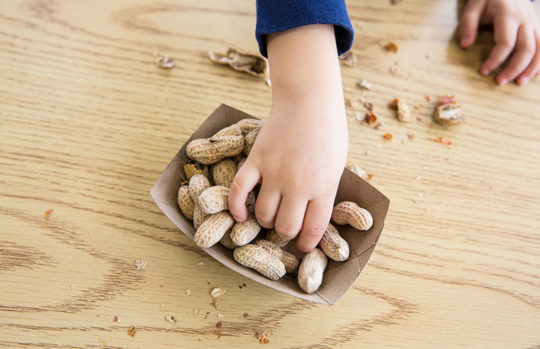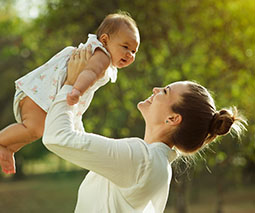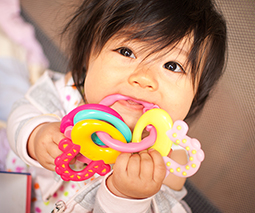‘I’ve got a sore tummy’: Understanding your child’s gut health

Vague complaints about tummy aches and mysterious sore bellies seem to part of the parenting landscape for many families. Whether it’s from eating too much, not enough, or from eating the wrong things, it can be challenging work attempting to decipher the cause of a sore tummy.
But did you know that up to 80 percent of the immune system is in the gastrointestinal tract? So it is important to know what is going on in there to give your kids the best opportunity to have a strong, healthy, robust immune system and a healthy, happy life.
Karina Savage, a paediatric gut health dietitian, has some great advice for parents that will help understand what’s going on in their child’s gut.
Listen to Karina Savage on Feed Play Love:
Firstly, it’s important to know that complaining of a tummy ache is often a young child’s way of communicating that they’re feeling unwell, Karina explains. However, there is a rise in tummy troubles in children these days, so we certainly need to pay attention to ongoing tummy troubles.
Symptoms of gut problems
An unhealthy gut can contribute to a wide range of health issues and it can be tricky to get to the bottom of what exactly is the cause. “Babies with colic and reflux and a cow’s milk protein allergy need a different approach to a toddler with diarrhoea and tummy pain,” Karen says.
Common symptoms of gut problems include:
- Gas
- Bloating
- Constipation
- Diarrhoea
- Abdominal pain
- Nausea
Gut health and the first 1,000 days
The first thousand days of your child’s life (this is the period lasting from conception to their second birthday) will influence how their gut and immune system develops. Ensuring lifelong good gut health comes about when there is a robust colonisation of the gut during those first thousand days of life.
Karina explains the science: “The first thousand days helps to shape their lifelong gut signature, so to speak. By the age of three, your gut microbiota, or microbiome, becomes a bit more adult-like and set. [After this age] lifestyle factors from this point are the main influence on the gut microbiota … and certainly the biggest way we can improve and nurture our children’s gut health is by giving them enough fibre in their diet.”
Karina is a strong believer in the power of plant foods. “I think what we need to realise is that the humble plant foods such as broccoli and pears and peas and apples … those fibres are absolute king for our gut, because if we don’t put enough fibre into our gut, the bacteria in our gut has to turn to the mucus in our gut to get that nutrition. And then that creates a leaky gut.”
So fibre is king. “We can keep the whole ecosystem happy and sound by simply eating good amounts of plant foods, fruits, vegetables, whole grains, nuts and seeds.”

How worried should I be about my fussy eater?
So you’ve done all the rights things nutritionally for the first years of your child’s life – but suddenly overnight (or so it seems!) all that good work is being undone by their refusal to eat any food that isn’t white.
Karina says don’t panic. The preschool years are notorious for fussy eating and we should just do what we can to encourage good eating habits.
“I feel like we’ve got so much pressure on us as parents to get all the colours of the rainbow in by a certain age. But that’s not realistic. If we can get some of those colours in – if we can get some fibre in – then fantastic. It’s just a work in progress.”
Karina’s advice is to keep offering plant foods at every single main meal and snack: “Just put it there. Repeated exposure is king. Even if they don’t accept it now, don’t pressure them, but they’ll eventually take it. And if you’re eating with them, that’s also key. They see you eating it and eventually they’ll like to eat it too. Children are naturally inquisitive and they will eventually expand their repertoire.”

Strategies for encouraging fussy eaters to try new foods include:
- Having set meal and snack times
- Eating with your children
- Giving repeated exposure to new foods
- Including ‘safe’ foods on their plate – foods that you know they like and can fill up on.
Probiotics and gut health
Probiotics – the ‘good’ bacteria believed to help maintain optimum digestive health – are often recommended as a way of boosting the immune system. But how effective are they for children?
“Probiotics are certainly beneficial for children who are more prone to a disbiotic gut [microbial imbalance],” Karen says. Children who may have grown up with a slight imbalance may need that balance corrected to enable them to have a healthier gut moving forward. And, along with a healthy balanced diet, probiotics are an effective way to correct that balance.
“There’s definitely research linking a reduction in sickness in children attending childcare and also a reduction in eczema and allergies with certain probiotics,” she explains. “I don’t think it’s necessarily beneficial to all as a blanket, but we are learning more and more about the benefit of probiotics for certain situations.”
Anxiety and tummy pain
With more and more research being done about how gut health can impact overall health and wellbeing, it appears that overall gut health can have a direct effect on mood and anxiety .
There is certainly a strong link between the gut and the brain axis, explains Karina, and there is still a huge amount to learn in this area.
“We are certainly seeing a link between poorer gut health and anxiety and mood, and certainly obesity and other conditions as well. So I think this is a ‘watch this space’ area. But I’m very much of the belief that our gut is the centre of of our health,” Karina says. “And that’s not just our physical health, in terms of how we’re feeling in our bodies. It’s also our minds and our thoughts. So I think there’s more of a relationship there than we previously thought.”
 Need some support to be the best parent you can be? Our Parent School parent coaching experts can help. Click to find out more or book a one-on-one session.
Need some support to be the best parent you can be? Our Parent School parent coaching experts can help. Click to find out more or book a one-on-one session.









